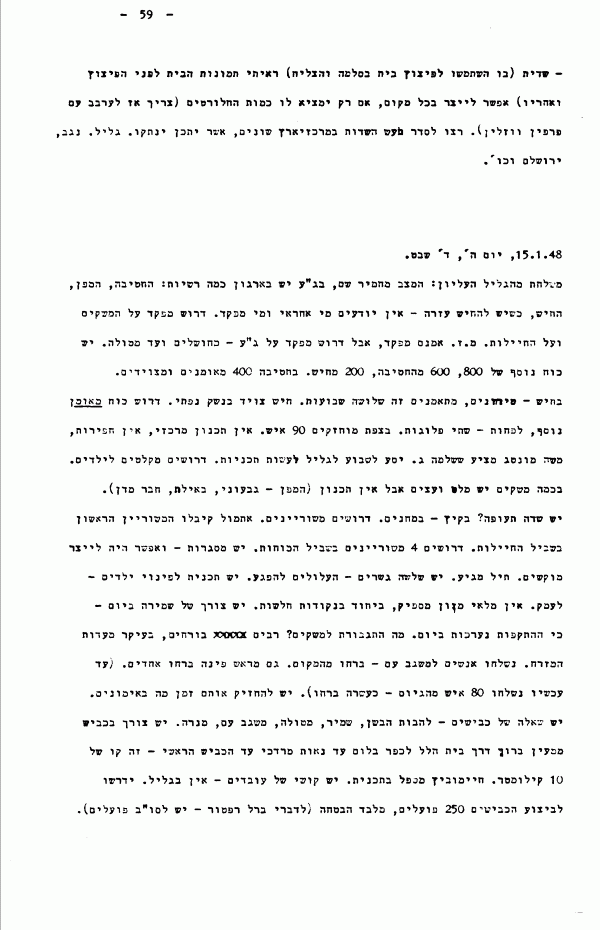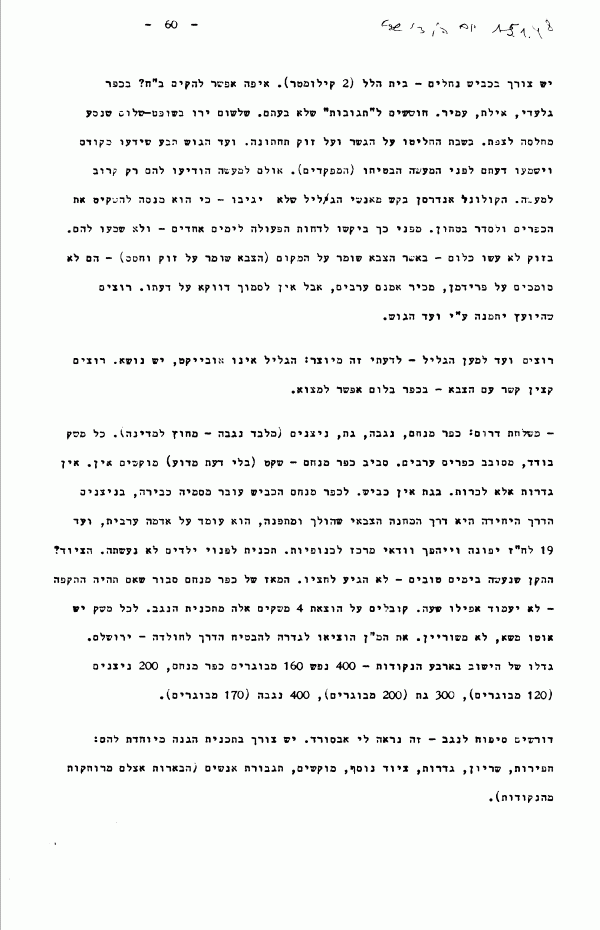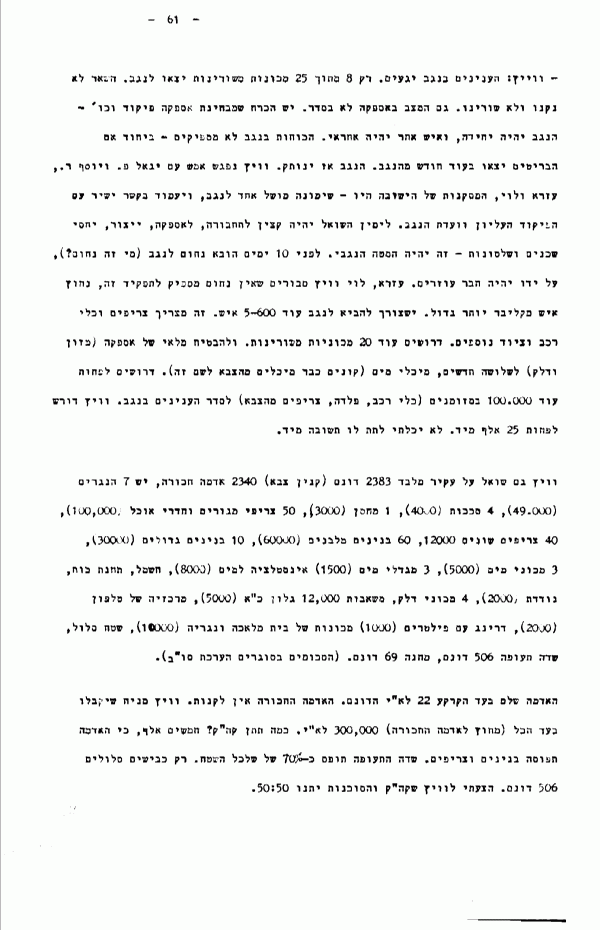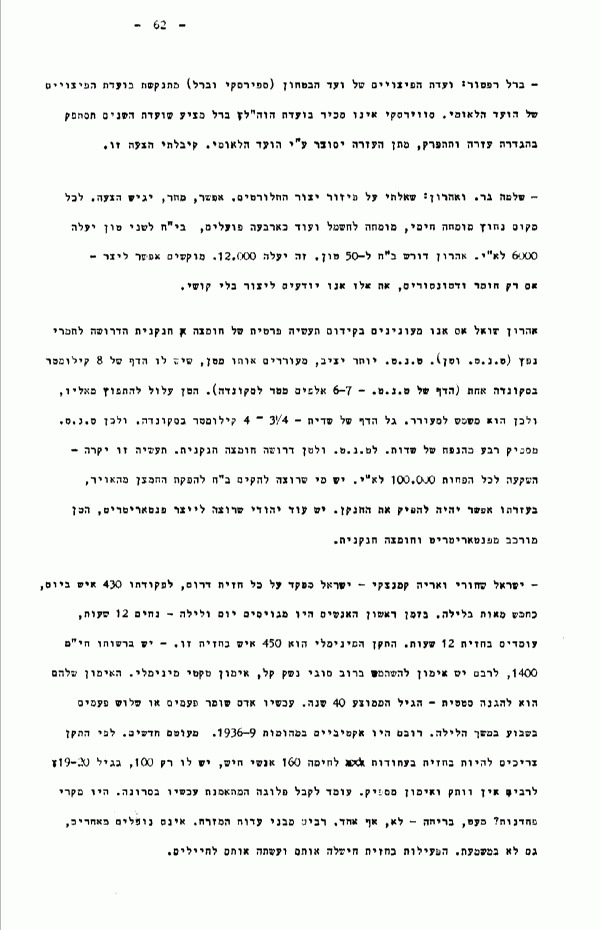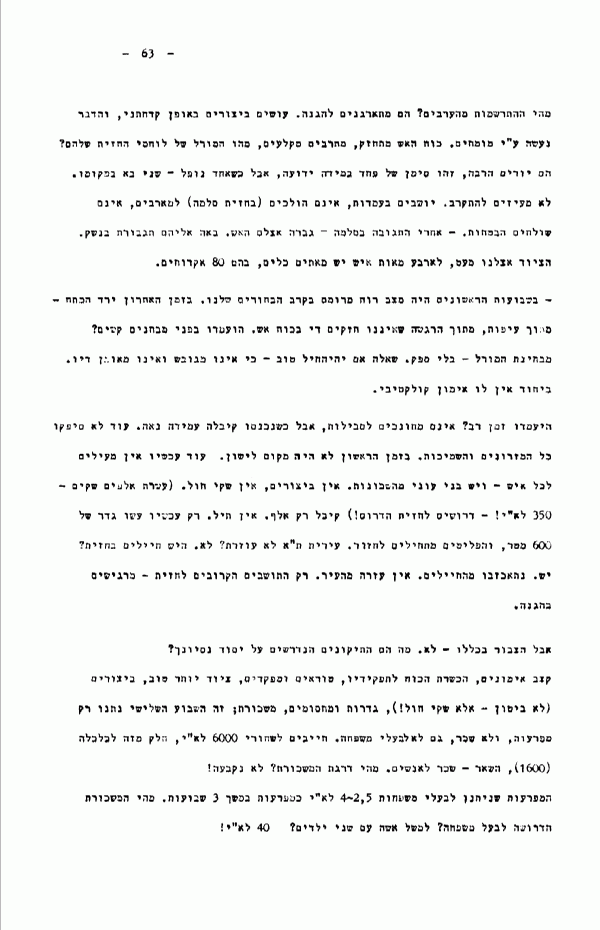1
of
Places:
Safed
Dan
Metal
Misgav Am
Rosh Pinna
Shamir
Bet Hillel
Amir
Gat
Negba
Gedera
Jerusalem
Sarona
Lifta
The use of the photograph is subject to the Copyright Law, 2007
15.01.1948
224823
Thursday, January 15, 1948 A delegation from the Upper Galilee: The situation there is getting worse. The “Organization” in the Upper Galilee has a number of authorities: the Brigade [Palmach], the SC [subdistrict commander], the Hayish. When they need urgent help – they don’t know who’s responsible or who’s in command. Need a commander to oversee the settlements and the corps [Palmach and Hayish units]. Moshe Zelicki [Carmel] is indeed the [northern] commander, but [we] need a commander for the Upper Galilee – from HaHolshim [Ami’ad] to Metulla. There’s another force [there] of 800 men – 600 from the Brigade [Palmach], 200 from Hayish. The Brigade has 400 [who are] trained and equipped. In Hayish – new recruits, who’ve been training for three weeks. Hayish is equipped with subdistrict weapons [weapons that were provided to the subdistrict]. Need another trained force, at least – two companies. 90 men are being kept in Safed. There’s no central planning, no excavations [trench digging]. Moshe Montag [Mann] proposes that Shlomo G. [Gur] go to the Galilee for a week to make [fortification] plans. Need shelters for children. A few settlements have cement and wood but there’s no planning (the SC [subdistrict commander] – Givoni, is a member of [Kibbutz] Dan, based in Ayelet [HaShahar]). Is there an airfield? – In the summer – in Mahanayim. Need armored vehicles. Yesterday they received the first armored vehicle for the corps [transfer of forces]. Need 4 armored vehicles for the forces. There are metal workshops – and it’ll be possible to produce mines. Barbed wire is arriving. There are three bridges that could be damaged. There is a plan to evacuate children – to the [Jezreel] Valley. There aren’t enough food stocks, especially in weak settlements. There’s a need for daytime protection – because the attacks occur during the day. What’s the reinforcement for settlements? – Many [from the reinforcement] are deserting, especially from Mizrahi [Eastern] communities. Men were sent to Misgav Am – they deserted [because of] the cold. A few also deserted Rosh Pinna (so far 80 men from the draft have been sent there – about ten deserted). They need to be kept in training for some time [before they’re sent off]. There’s a question of roads: Lehavot HaBashan – Shamir, Metualla – Misgav Am – Manara. There’s a need for a road from Ma’ayan Baruch through Bet Hillel to Kefar Blum up to Ne’ot Mordechai. Up to the main road – it’s a stretch of 18 kilometers. Haimovich [sp.] [Dov Givon] is handling the plan. There’s a problem with workers – there aren’t any in the Galilee. Implementing the roads [plan] will require 250 laborers, and a [protective] force (according to Berl Raptor – Solel Boneh has laborers). There’s a need for a Nahalim – Bet Hillel road (2 kilometers). Where can a hospital be established? – In Kefar Gil’adi, Ayelet [HaShahar], ‘Amir. There are concerns about untimely “responses” [on our part]. Yesterday a magistrate court judge traveling from Khalisa to Safed was shot. On Saturday they decided [to launch a raid against] the bridge and Zuq Tahtani. The Bloc Committee demanded that it be notified [of the operations] in advance, and that its view be heard before action is taken. [The commanders] promised to do so, but in fact they only notified them right before the action. Colonel Anderson [the English battalion commander in Metulla] asked the Galilee men not to respond – because he’s trying to keep the villages quiet and establish security. For this reason they asked that the operation be postponed a few days – and they didn’t listen to them. In Zuq they didn’t do anything – given that the army is protecting the place (the army is protecting Zuq and Khisas). They don’t trust [Mano] Friedman [Arab affairs advisor in the Galilee]. Although he does know the Arabs, his opinion should not necessarily be relied on. They want the advisor to be appointed by the Bloc Committee. They want a committee for the Galilee. In my opinion this is superfluous: the Galilee is not an object [target], there are bearers [locals who can bear the burden]. They want a liaison officer [to liaise] with army – it’s possible to find [English speakers] in Kefar Blum. – Delegation [from the] south: Kefar Menahem, Negba, Gat, Nitzanim (aside from Negba – they’re outside of the state [per the Partition Plan]). Every settlement is isolated, surrounded by Arab villages. Around Kefar Menahem – there’s quiet (unclear why). There are no mines. No fences aside from cow [fences]. In Gat there’s no road. The road to Kefar Menahem passes through Masmiyya-Kabira. The only way [from the road] to Nitzanim is through the military camp that’s emptying out, which sits on Arab land. By the 19th of this month it will be evacuated, and will certainly become a center for gangs. No plan has been made for the evacuation of children. Equipment? – The standard that was established in good days – hasn’t reached half. The AC [area commander] of Kefar Menahem believes that if there’s an attack – it won’t hold out even an hour. They object to the removal of these 4 settlements from the plan for [the defense of] the Negev. Each settlement has a pickup truck, [but] no armored vehicle. The MG [Mobile Guard – comprising notrim, British-appointed guards] was reassigned to Gedera to safeguard the Hulda-Jerusalem road. The population size in the four settlements: Kefar Menahem 400 persons (160 adults), Nitzanim 200 (120 adults), Gat 300 (200 adults), Negba 400 (170 adults). They demand annexation to the Negev. This seems absurd to me. There is a need for a special plan of defense for them: excavations, armoring, fences, additional equipment, mines, reinforcement of men (their wells are far from the settlements). [Yosef] Weitz: Things in the Negev are wearying. Only 8 out of 25 armored vehicles went to the Negev. The rest weren’t bought and weren’t armored. The situation with supplies isn’t good either. In terms of supplies, command, etc. – the Negev needs to be a single unit, with one man in charge. The forces in the Negev are not enough – especially if the British leave the Negev in another month, then the Negev will be cut off. Weitz met yesterday with Yigal P. [Peikowitz-Allon] and Yosef [Avidar], Ezra [Danin], and Levi [Eshkol]. The conclusions of their meeting were – that one governor would be appointed for the Negev, and he would be in direct contact with the High Command and the Negev Committee. Alongside the governor there will be an officer for transport, for supplies, for production, for relations with neighbors and the governing authorities – this will be the Negev staff. 10 days ago Nahum was brought to the Negev (Nahum who? [Sarig]). With him was a group of assistants. Ezra, Levi, and Weitz believe that Nahum is not qualified for this role. Need someone of a higher caliber. [We] need to bring another 500-600 men to the Negev. This requires additional barracks and vehicles and equipment. Need another 20 armored vehicles, and to ensure stockpiles of supplies (food and fuel) for three months, water containers (they’re already buying containers from the army for this purpose). At least another P£ 100,000 in cash is required (vehicles, steel, barracks from the army) to sort things out in the Negev. Weitz requests at least 25,000 immediately. I couldn’t give him an answer immediately. Weitz is also asking about ‘Akir [Tel Nof]. Aside from 2383 dunams (army property) 2340 leased land, there are 7 hangars (49,000), 4 awnings [covered areas] (4000), 1 warehouse (3000), 50 housing and canteen barracks (100,000), 40 different types of barracks 12000, 60 rectangular buildings (60000), 10 large buildings (30000), 3 water facilities (5000), 3 water towers (1500), plumbing for water (8000), electricity, mobile power station (2000), 4 fuel facilities, pumps 12,000 gallons each (5000), a telephone switchboard (2030), [d-ring?] with filters (1000), machines for workshop and carpentry shop (10000), paved area, 506 dunam airfield, 69 dunam camp. (The amounts in parentheses are SB [Solel Boneh] estimates). The land complete for the plot [costs?] P£ 22 per dunam. The leased land is not for sale. Weitz assumes they’ll accept P£ 300,000 for everything (except for the leased land). How much will KKL give? – fifty thousand, because the land is occupied by buildings and barracks. The airfield takes up 70% of the territory. Just the paved roads are 506 dunams. I proposed to Weitz that KKL and the Agency give 50:50. – Berl Raptor: The Defense Committee’s compensation committee ([Moshe] Swirsky and Berl) clashes with the compensation committee of the National Council. Swirsky does not recognize the National Council’s committee. Berl proposes that a committee of the two limit itself to defining [the types of] help and disband. The provision of help will be arranged by the National Council. I accepted this proposal. – Shlomo [Gur] and Aharon [Katzir]: I asked about [the possibility of] distributing the production of chlorites [across various parts of the country – in case they are cut off]. It’s possible. Tomorrow he’ll submit a proposal. Each site will require a chemicals expert, an electricity expert, and about four additional workers. A factory for two tons will cost P£ 6,000. Aharon requires a factory for 50 tons. This will cost 12,000. Mines can be produced – with just material and detonators. These we know how to produce without any difficulty. Aharon asks if we’re interested in pursuing the private manufacture of nitric acid, which is necessary for explosive material (TNT and TEN [tetraeritrit nitrate]). TNT is more stable, it’s ignited by TEN, which has an explosive velocity of 8 kilometers per second (the explosive velocity of TNT – 6-7 thousand meters per second). TEN can spontaneously combust, and therefore is used as an ignitor. The explosive force of cheddite is 3¼ – 4 kilometers per second. And this is why TNT covers a quarter of the volume of cheddite. TNT and TEN require nitric acid. This industry is expensive – an investment of at least P£ 100,000. There are some who want to build a factory to extract oxygen from the air, and with it we’ll be able to produce the nitrogen. There’s another Jew who wants to produce pentaerythritol (TEN is composed of pentaerythritol and nitric acid). – Yisrael Shchori and Aryeh Kaminsky [sp.]: Yisrael is in command of the entire southern front [of Tel Aviv], in charge of 430 men during the day, about 500 at night. At first the men were enlisted day and night – resting 12 hours, stationed at the front 12 hours. The minimal standard is 450 men at this front. He has 1,400 garrison men available to him, most of them have training in the use of most types of light weapons, as well as minimal tactical training. Their training is for static defense. The average age is 40 years. Now an individual stands guard two or three times per week throughout the night. Most of them were active in the 1936-9 riots, a minority of them are new. According to the standard, there should be 160 Hayish men as “combat reserves” at the front. He only has 100, aged 19-20. Many have no time served or enough training. He’s about to receive a company now undergoing training in Sarona. Were there cases of cowardice? – A few. Desertion? – No, not a single one. Many [of those serving under him] are from Mizrahi [Eastern] communities, they do not fall below the others, not in terms of discipline either. The action at the front toughened them and turned them into soldiers. What’s [their] impression of the Arabs? – They’re organizing for defense, feverishly making fortifications, and this is being done by experts. Their firepower is getting stronger, [light] machine guns are growing in number. How’s the morale of their fighters at the front? – They shoot a lot, and this is known to be a sign of fear, but when one falls – a second comes in his place. They don’t dare to come close. They remain at their outposts, don’t go (at the Salameh front) to ambushes, don’t send security [force]s. After the response in Salameh – their shelling increased. They received a reinforcement in arms. We have little equipment. For 400 men there are 200 instruments, of which there are 80 pistols. For the first few weeks our men were in high spirits. Recently the tension has dropped – out of exhaustion, out of the sense that we’re not strong enough in terms of firepower. Will they stand up to difficult tests? – In terms of morale – undoubtedly. The question is whether this will be a good corps – because it’s not yet consolidated and not trained enough, and especially if it doesn’t have collective training. Will they hold out long? – They’re not trained for stamina, but when they were tested they demonstrated good fortitude. Not all of the mattresses and blankets have been supplied yet. At first there wasn’t [enough] space to sleep. There still aren’t [enough] coats for everyone – and there are men from poor neighborhoods. There are no fortifications, no sandbags (10,000 bags – P£ 350! – are needed for the southern front!). He received only a thousand. No barbed wire. Only now did they build a fence of 600 meters, and the refugees are starting to return. The Tel Aviv municipality isn’t helping? – No. Are there soldiers [veterans from the British army] at the front? Yes. They were disappointed with the soldiers. There’s no help from the city. Only the residents near the front – feel the “Haganah.” But the public as a whole – doesn’t. What needs to be fixed, based on your experience? – The pace of training, preparing the force for its roles, new recruits and commanders. Better equipment, fortifications (not concrete – but sandbags!), fences and barricades. Salary! This is the third week in a row that [his men] received only past-due payments, not wages, including heads of families. There’s cause for concern that they’ll stop coming. All the garrison force are heads of families. Shchori [his front] is owed P£ 6,000, some of this (1,600) for running costs, the rest – wages for the men. What’s the salary rank? – Hasn’t been set! The past due payments that were given to heads of families were P£ 2.5 – 4, as past-due payments for three weeks. What salary does a head of family require? For example, a wife with two children – P£ 40! – In the evening a gathering of the members of the security committees in the south, in the Chug HaBima [auditorium]. I gave an overview of the war we are facing. [After my remarks] there were questions and contentions. I answered by explaining the principal change that has taken place in our defense needs: defense of the country and the absence of a foreign government, and I explained what it will take for us to win. On the 13th of this month at 1:45 p.m. Dr. Khalidi [sp.] spoke with the Mufti. Dr. Khalidi said: “We’re in a very difficult situation. Even more difficult, if Jamal Effendi [Jamal al-Husayni] is reporting on our situation without actually coming here and seeing and reporting. Riad al-Solh [prime minister of Lebanon] told me that Jamal reported that the situation in the country is not as bad as it [actually] is, and this cannot be. There are no men and no discipline, no weapons, no ammunition, and more than that, products, food supplies. A black market is flourishing. The economy is being destroyed, and in military terms – 10 homes were just bombed in Sheikh Jarrah, houses were burned, people were killed, and the army and the police along with the Jews – are shooting at us and killing us. How long can such a situation continue? The answer will come from you. I was forced to send letters with special runners to distant areas, to the north, to the south, to have them send us a company with weapons from anywhere. Sir, it’s impossible to bear such responsibility – the responsibility is too great for 2-3 men. One evening they attack Beit Safafa, the next evening they bomb Sheikh Jarrah, and then they attack Lifta. A state of fear has emerged among the Arabs. Jerusalem is emptying out, it’s necessary to save Jerusalem, because this is an important role. This is the real situation, there’s no flour, no food. The Mufti answered: “Large and sufficient quantities will reach you.” Khalidi replied: “Yes, good, but these quantities need to be in trustworthy hands, so that they don’t become part of the black market, and they need to be distributed correctly. And perhaps you could make a public appeal to the Arab countries and make them aware of the real situation in [Palestine]? The responsibility is great and someone needs to come here.” The rest of the conversation was in Turkish. Khalidi noted three matters of concern: 1) In military terms there’s a need for weapons and merchants (? [Ben-Gurion]) and discipline. 2) The economic hardship. 3) Of greater concern is the matter of spies. The Mufti answered: “In any event, we’re here; for our part, we’ll do everything. And in the coming days you’ll receive a large quantity of “maun” [Arabic for provisions, food supplies].





